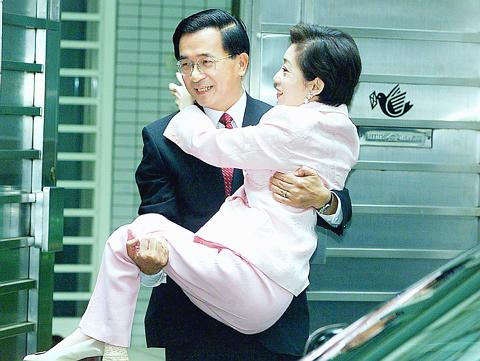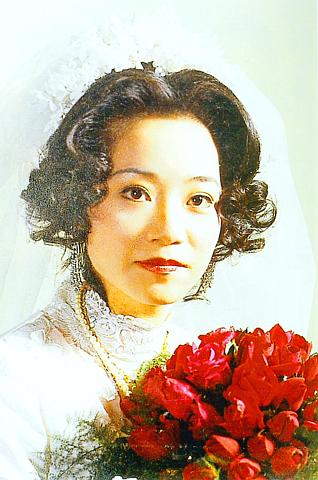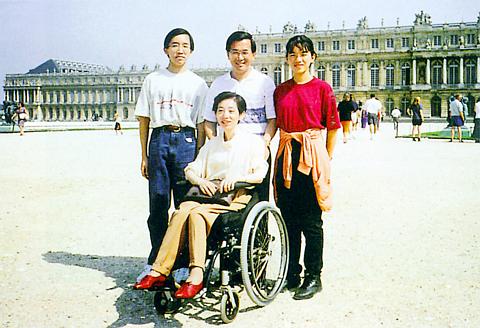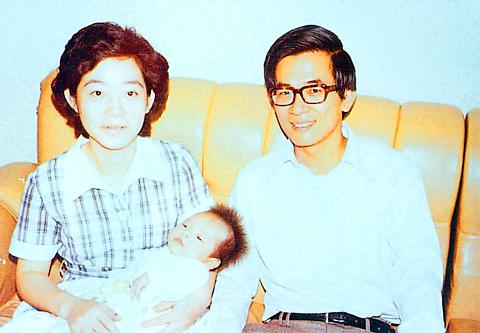President Chen Shui-bian's (
But this ordinary lifestyle cannot hide the extraordinary lives of Chen Shui-bian and Wu Shu-chen, (
Sound like an FTV melodrama? Well, it will be. At least three TV channels have or are preparing versions of Chen's story, with the first being San-lih channel's "A-bian and A-chen" (

PHOTO: REUTERS
The First Lady's early memories of Chen trace back to their school days in Tainan County. She remembers a dark, thin, small boy -- in other words, unimpressive -- from her elementary school who always earned top commendations from teachers. Many years later, during Chen's college years, Wu was still nonplussed, but nevertheless agreed to a date with the curious, bookish man with Coke-bottle glasses. During this first date, perhaps with the hope of impressing her with his academic prowess, Chen gave Wu "a tedious law textbook" as a present.
Despite such clumsiness at wining and dining, Chen had a patience and determination to be the best thing that ever happened to Wu.
In her biography, Walking Out of Silver Spoon (

She would later encounter more of the man's deep commitment to those he loved. After getting his license to practice law during his third year of university, Chen ventured into maritime law and made the beginnings of a small fortune early in his career. But he gave most of his earnings to his impoverished family and paid off the family debts. "It wasn't until that time that I realized Chen's family was in such a difficult position," she said last week.
As Chen and Wu grew closer, the latter's arrogance and stubbornness occasionally irritated Chen. "Don't take me as one of your servants," Chen once said, according to Wu. But these were also qualities that aided their decision to get married in the face of stiff resistance from her well-heeled family. "The more my father objected to this marriage the more I wanted to marry him," she said. He wanted his daughter to marry a doctor; Wu left home and married the young lawyer instead.
It was also Wu's stubbornness, combined with a strong sense of justice, that helped push Chen into the world of politics. It was Wu who persuaded Chen, at the time a successful lawyer, to join the defense team for the eight accused of inciting the Kaohsiung Incident (

PHOTO: COURTESY OF WU SHU-CHEN
In November 1974, Chen lost his bid for the Tainan County magistrate by a narrow margin. During a thank-you campaign for his supporters, Wu was walking along with the campaign staff when a truck hit her. Hardly an accident, the truck backed up to run over her two more times, leaving Wu lying on the street, blood mingling with her red dress. "I just felt sluggish all over, like I was dying, and my lower body was all numb," Wu recalled.
Although Wu survived, barely, she was paralyzed from the chest down. "I saw A-bian running back with a pale face, holding his wife, hands shivering. But Shu-chen was very calm the whole time, shedding no tears, just weakly telling Chen some important family affairs in case she could not hold onto her life," said Chen Chun-ying (
The attack was believed to be politically motivated. "I believe it was related to local factions which were affected by the election result," said Wu. But the attack, contrary to its intended purpose of scaring Chen out of politics, assured his political involvement and cemented the couple's relationship. "The more difficult the situation, the more determined he is. The more you pressure him, the stronger his reaction. So if the KMT did not push him this hard maybe we would not have today's Chen Shui-bian" she said.

PHOTO COURTESY OF WU SHU-CHEN
The three sequential misfortunes in 1974 -- an election defeat, the car attack and his later imprisonment immediately after Wu was discharged from the hospital -- became an unmitigated motivation for success. "We have been step-by-step striving to reach our goals, and in the process, we've also paid a huge price throughout the years with our involvement in politics," Wu said.
One of the sacrifices was the humiliation of a public airing of the couple's sex life. In previous elections, rumors about Chen having mistresses or prostitutes because of Wu's physical condition made for sensationalistic headlines. "As Chen Shui-bian's wife, I had to explain to the public how our sex life is," she said. And again she refuted the rumors. "With basic medical knowledge you would know there can be a sex life for a spine-injured person. And you know that for such a busy, tight-scheduled politician he [Chen] does not have so much energy for a lot of sex. So in a way we match well in this matter," she said.
Wu sometimes thinks that if not for the incident, President Chen may have had more domestic problems -- just slightly more intimate in nature. "Very often he goes to sleep immediately after coming home, because he is too exhausted from work," she said. "I'm a forthright person and I'm not scared of talking about sex. But this matter takes time and atmosphere. It's not like a James Bond movie, where you can have intimacy at any dangerous moment."
But even when they are intimate, President Chen still finds it hard to put politics second. "We talk about politics in bed," Wu conceded. "He usually proudly shows me what praises he received from media that day, or how foreign media have commented on him." And even in the middle of the night, Chen is sometimes more concerned about his political performance. "Even with only underwear on at midnight, he would sometimes get up to check poll results from the fax machine," said Wu.
However, the new president isn't always so serious. The First Lady revealed that President Chen likes to play kissing games with Honey, the "First Dog." How's that for romantic?

Taiwan has next to no political engagement in Myanmar, either with the ruling military junta nor the dozens of armed groups who’ve in the last five years taken over around two-thirds of the nation’s territory in a sprawling, patchwork civil war. But early last month, the leader of one relatively minor Burmese revolutionary faction, General Nerdah Bomya, who is also an alleged war criminal, made a low key visit to Taipei, where he met with a member of President William Lai’s (賴清德) staff, a retired Taiwanese military official and several academics. “I feel like Taiwan is a good example of

March 2 to March 8 Gunfire rang out along the shore of the frontline island of Lieyu (烈嶼) on a foggy afternoon on March 7, 1987. By the time it was over, about 20 unarmed Vietnamese refugees — men, women, elderly and children — were dead. They were hastily buried, followed by decades of silence. Months later, opposition politicians and journalists tried to uncover what had happened, but conflicting accounts only deepened the confusion. One version suggested that government troops had mistakenly killed their own operatives attempting to return home from Vietnam. The military maintained that the

Jacques Poissant’s suffering stopped the day he asked his daughter if it would be “cowardly to ask to be helped to die.” The retired Canadian insurance adviser was 93, and “was wasting away” after a long battle with prostate cancer. “He no longer had any zest for life,” Josee Poissant said. Last year her mother made the same choice at 96 when she realized she would not be getting out of hospital. She died surrounded by her children and their partners listening to the music she loved. “She was at peace. She sang until she went to sleep.” Josee Poissant remembers it as a beautiful

Before the last section of the round-the-island railway was electrified, one old blue train still chugged back and forth between Pingtung County’s Fangliao (枋寮) and Taitung (台東) stations once a day. It was so slow, was so hot (it had no air conditioning) and covered such a short distance, that the low fare still failed to attract many riders. This relic of the past was finally retired when the South Link Line was fully electrified on Dec. 23, 2020. A wave of nostalgia surrounded the termination of the Ordinary Train service, as these train carriages had been in use for decades